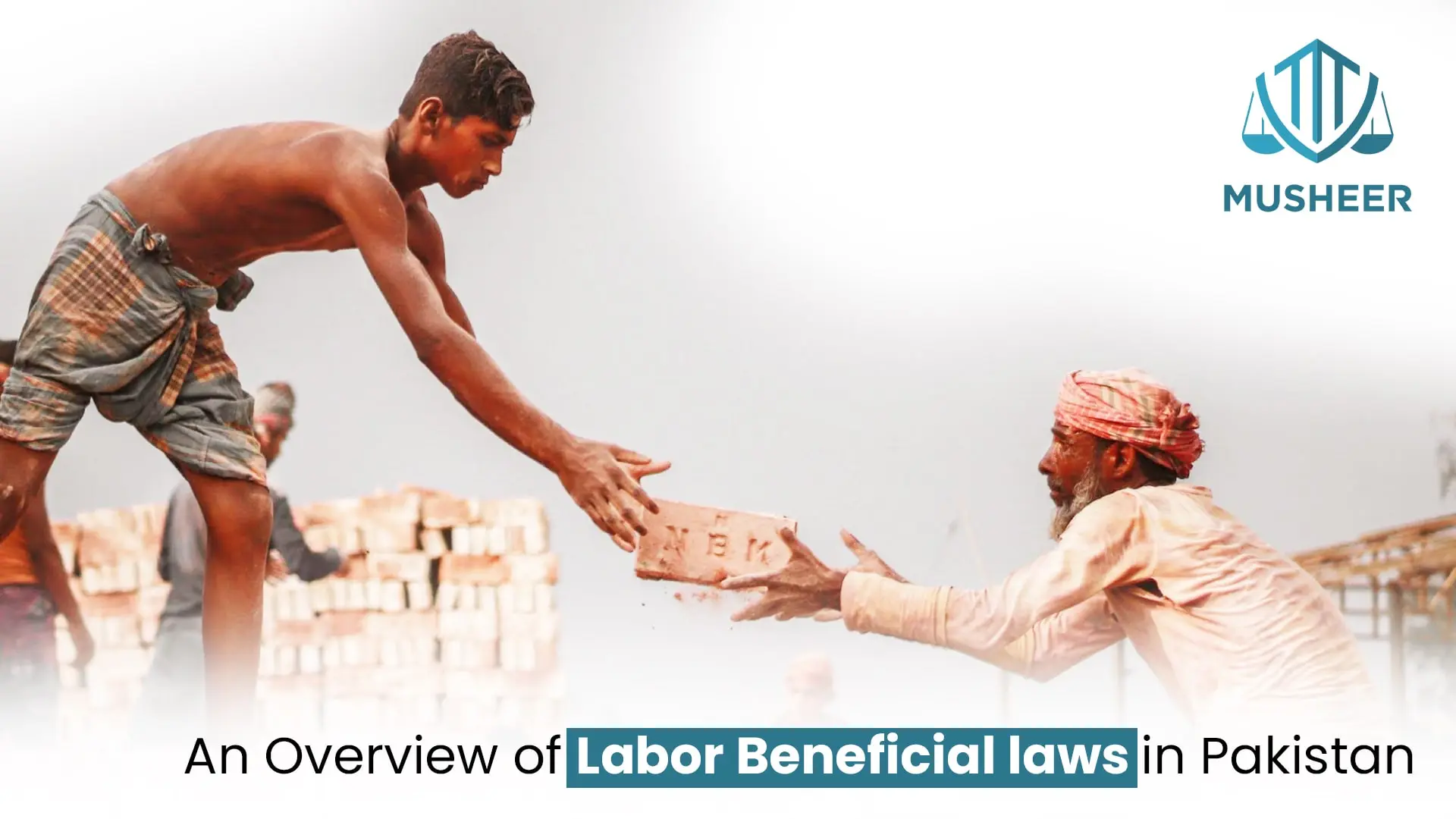There are a number of Labour legislations applicable in Pakistan which cover a wide range of aspects of the working conditions of labour. Courts in Pakistan also tend to take a lenient view regarding labour practices and are more inclined towards the workman in any conflict between him and his employer.
The labour laws in Pakistan extend a wide range of benefits to workers related to:
-
Industrial Relations
-
Employment and Services Conditions
-
Working Hours
-
Occupational Safety and Health
-
Labour Welfare
Constitution of Pakistan, 1973
The Constitution of Pakistan, 1973 (the “Constitution”) safeguards the rights of workmen and provides the ‘grundnorm’ for all labour legislation to follow suit. As provided in the Constitution, some fundamental rights related to labour are:
- (1) Article 11 of the Constitution prohibits all forms of forced labour. Article 11 also states that a child under fourteen shall not be engaged in any factory or other hazardous employment.
11. Slavery, forced labour, etc., prohibited
(2) All forms of forced labour and traffic in human beings are prohibited.
(3) No child below the age of fourteen shall be engaged in any factory, mine, or other hazardous employment.
(2) Article 17 of the Constitution gives citizens the right to form associations and unions. Article 18 provides every citizen has the right to enter any lawful profession. Article 25 ensures equal protection of the law regardless of gender in all aspects of life, including the workplace.
17. Freedom of association
Every citizen shall have the right to form associations or unions, subject to any reasonable restrictions imposed by law in the interest of the sovereignty or integrity of Pakistan, public order or morality.
18. Freedom of trade, business or profession.
Subject to such qualifications, if any, as may be prescribed by law, every citizen shall have the right to enter upon any lawful profession or occupation and conduct any lawful trade or business.
25. Equality of citizens.
-
All citizens are equal before the law and are entitled to equal protection of the law.
-
There shall be no discrimination based on sex.
-
Article 37 of the Constitution provides that the state shall ensure adequate provision for securing just and humane work conditions. The state is duty-bound to ensure that children and women are not employed in jobs unsuitable for them. The article also casts a duty on the state to provide maternity benefits for women in employment. In addition, Article 38 also mandates that the state is duty-bound to secure its people's well-being and provide social security for all persons employed in the service of Pakistan.
37. Promotion of social justice and eradication of social evils.
The State shall:
(e) make provision for securing just and humane conditions of work, ensuring that children and women are not employed in vocations unsuited to their age or sex, and for maternity benefits for women in employment;
38. Promotion of social and economic well-being of the people.
The State shall:
(a) secure the well-being of the people, irrespective of sex, caste, creed or race, by raising their standard of living, (…) by ensuring equitable adjustment of rights between employers and employees, and landlords and tenants;
|
(c) |
provide for all persons employed in the service of Pakistan or otherwise, social security by compulsory social insurance or other means; |
1. Industrial Relations
Every province in Pakistan has its Industrial Relations legislation. These legislations are very similar and just vary on the minute details if they do. The basic principles and rights provided remain the same. The workers' rights as provided in the Industrial Relations Act 2012 (IRA 2012) under Schedule II are
a. Right to work, wage and welfare.
It is the right of a worker to work according to the job assigned and to receive wages per agreed terms and conditions of employment and to such welfare benefits and safety measures as one is entitled to according to law, agreement settlement and/or award.
b. Right to Freedom of association, collective bargaining, and other rights secured or guaranteed under the Industrial Relations Act, 2011, and other laws.
The worker has an unfettered right to enjoy the benefits guaranteed to him under the law, rules, settlement, agreement, and award and in line with the principles of social justice.
i) The Right to form Trade Unions
Unions fall under the right to association, a fundamental right guaranteed by the Constitution. It has been held in Civil Aviation Authority v. Union of Civil Aviation Employees, PLD 1999 SC 781
25. …The operation of a union is the sine qua non for exercising the fundamental rights guaranteed under Article 17(1) of the Constitution.
2. Employment and Services Condition
i) IRA 2012
The provision of law regarding the employment of workers, their termination and conditions of services of employees as mentioned in IRA 2012 reads:
64. Conditions of service to remain unchanged while proceedings pending
(2) Notwithstanding anything contained in sub-section (1), an officer of a registered trade union shall not, during the pendency of any proceedings referred to in subsection (1), be discharged, terminated, dismissed or otherwise punished for misconduct, except with the previous permission of the Commission.
ii) Industrial and Commercial Employment (Standing Orders) Ordinance 1968
The Industrial and Commercial Employment (Standing Orders) Ordinance 1968 (the “Ordinance”) governs the basic terms of the employment of any workman in a labour setting from their appointment to the termination. The Ordinance applies to all industrial establishments employing more than twenty workers. The Ordinance is a highly beneficial legislation and caters to a wide range of issues a workman has to face. It specifically ensures that the termination or dismissal of the workman is not arbitrary, and if he is so terminated or dismissed, he is not left defenceless. The termination and dismissal are done through a proper formal procedure.
12. Termination of employment.
(1) For terminating the employment of a permanent workman for any reason other than misconduct, one month's notice shall be given either by the employer or the worker. One month's wages calculated based on average salaries earned by the workman during the last three months shall be paid in lieu of notice.
(3) The services of a workman shall not be terminated, nor shall a workman be removed, retrenched, discharged or dismissed from service, except by an order in writing which shall explicitly state the reason for the action taken….
15. Punishments
(4) No order of dismissal shall be made unless the workman concerned is informed in writing of the alleged misconduct [within one month of the date of such misconduct or of the date on which the alleged misconduct comes to the notice of the employer] and is allowed to explain the circumstances alleged against him.
3. Working Hours
The working hours for labourers are given under the Factories Act 1934, Chapter IV: Restriction on Working Hours of Adults. Section 34 provides that “no adult worker would be allowed or required to work in a factory for more than 48 hours in a week; if the factory is seasonal, 50 hours a week, and if the work is continuous, he may work for 56 hours in a week. As for daily hours, these may not be more than 9 hours a day (in case of seasonal, 10 hours).”
Section 54 of the Factories Act provides that the working hours of child/adolescent (15-18) are 5 hours a day. The Factories Act applies to all precincts employing ten or more workers. The law makes provisions for one weekly holiday; if that is not given, a compensatory holiday shall be given as soon as possible. Shops and Establishments Ordinance 1969 and Mines Act 1923(Section 22-B and 22-C) also limit the weekly hours to 48 hours. The above ordinance covers shops and commercial establishments not covered by the Factories Act and Mines Act. Any adult worker must work overtime if asked, and the overtime pay rate is double the usual pay (Section 47). Overtime is not payable to the contract workers employed on a piece-rate basis.
4. Occupational Safety and Health
Regarding leaves, the Shops and Establishments Ordinance 1969 provides under Sections 14 and 15 that after one year of continuous employment, every employee is allowed paid leave for 14 days and casual leave for ten days.
Employees are also entitled to maternity leave under the Maternity Benefits Ordinance of 1958. Section 4 of the Ordinance provides that a woman employee shall be paid wages “at the rate of her wages last paid during six weeks immediately preceding and including the days on which she delivers the child and for each day of six weeks succeeding that day.” Moreover, Section 7 provides that a woman absenting herself under this Ordinance shall not be dismissed.
Factories Act 1934, under its Chapter III (Health and Safety), provides further occupational safety measures such as for fire, water, disposal of wastes, ventilation, compulsory vaccinations, fencing of pieces of machinery, fumes etc.
5. Labour Welfare
The Worker’s Welfare Fund Ordinance 1971 was made for providing residential accommodation and other facilities for workers and for matters connected in addition to that or incidental to that.
Section 6 of the Worker’s Welfare Fund Ordinance reads:
6. Purposes to which money in the Fund may be applied
Money in the Fund shall be applied to
-
The financing of projects connected with the establishment of housing estates or the construction of houses for the workers;
-
The financing of other welfare measures including education training, re-skilling and apprenticeship for the welfare of the workers;
-
The meeting of expenditure in respect of the cost of management and administration of the Fund;
-
The repayment of loans raised by the Governing Body; and
-
Investment in government, government guarantees, non-government securities and Real Estate.






